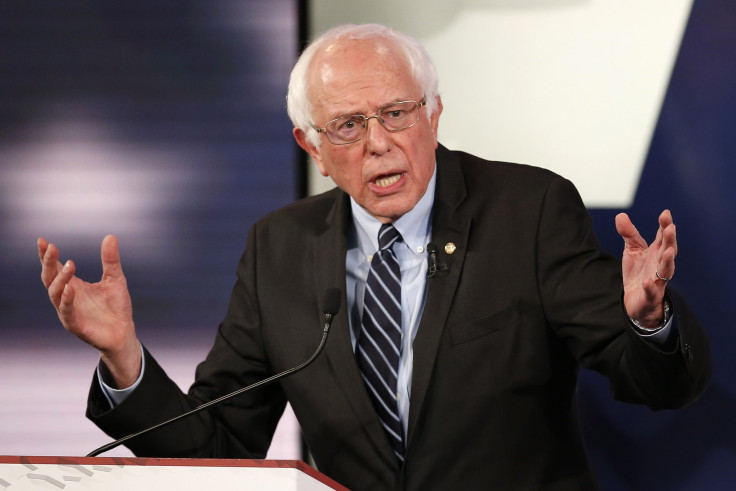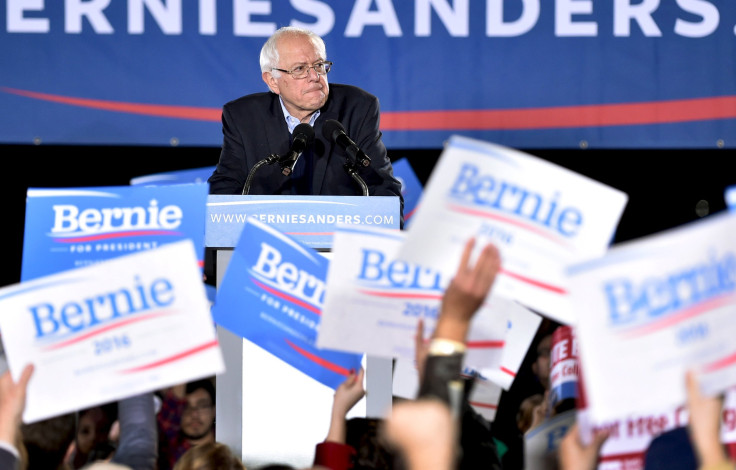Democratic Debate 2015: Bernie Sanders Gets Rough With Hillary Clinton

In one of the more notable moments of the second Democratic debate Saturday night, Vermont Sen. Bernie Sanders sparred with former Secretary of State Hillary Clinton on her ties with Wall Street, arguing that candidates need to "show by example" and that they need to not be too reliant on large corporations and Wall Street donors. He said Clinton's "comprehensive, tough plan" to regulate Wall Street was "not good enough."
But while Sanders appeared to launch some of his strongest attacks yet against Clinton, the former secretary of state did not act flustered, and defended herself by pointing out that she helped re-build Wall Street and New York City after the 9/11 terrorist attack. Throughout the race to the 2016 presidency, Sanders has consistently trailed Clinton, and his second debate performance was likely not strong enough to put him ahead of the former Secretary of State.
The primary debate Saturday night featured the three remaining candidates in the Democratic field; Sanders, Clinton and former Maryland Gov. Martin O’Malley. "Face of the Nation" anchor John Dickerson served as the moderator, and had told the Des Moines Register earlier this week that he had planned to focus the debate on the economy. But the debate came just one day after terror attacks plagued Paris, killing and injuring more than 500 people. An aide of Sanders reportedly "threw a fit," after CBS News informed him that the debate would instead kick off with a focus on Paris, CNN reported.
"This wasn't part of the deal. It shouldn't be allowed. It wasn't advertised as a foreign policy debate and it's turning into a debate it wasn't supposed to be," the aide, Mark Longabaugh, argued, CNN reported.
In his opening statement, while other candidates largely focused on the grisly terror attacks launched by the Islamic State group throughout Paris the night before, Sanders touched on the attacks but quickly moved on to a message largely focused on inequity and campaign finance. Sanders called for campaign finance reform several times during the debate, and took on Clinton multiple times. He also drew a connection between Clinton's 2003 vote for the invasion of Iraq to the growing Islamic State group network, arguing that the invasion led to the unraveling of the region.

In the race to the 2016 presidency, Clinton is leading the Democratic field with 52 percent of support from Democratic primary voters, followed by Sanders with 33 percent and O’Malley with 5 percent. A recent CBS News/ New York Times poll also revealed that 62 percent of Democratic primary voters believed Clinton could bring real change in ways things are done in Washington, D.C., while 51 percent of voters thought Sanders could do the same. However, a new McCarthy-Marist poll found that Sanders is beating Republican candidate and businessman Donald Trump by 12 percentage points at 53 to 41, as well as Republican candidate and former Florida Gov. Jeb Bush by 10 percentage points at 51 to 41.
The debate Saturday night was held at Drake University in Des Moines Iowa, and aired on CBS at 9 p.m. EST.
© Copyright IBTimes 2024. All rights reserved.






















